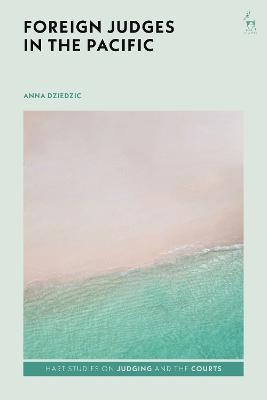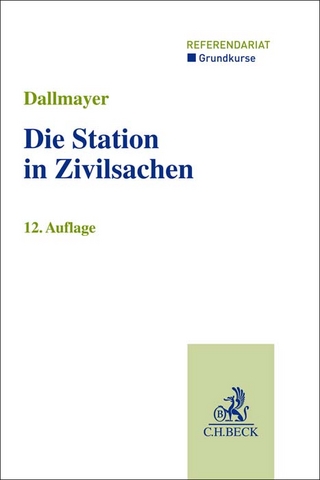
Foreign Judges in the Pacific
Hart Publishing (Verlag)
978-1-5099-4290-9 (ISBN)
We often assume that the judges sitting on domestic courts will be citizens. However across the island states of the Pacific, over three-quarters of all judges are foreign judges who regularly hear cases of constitutional, legal and social importance. This has implications for constitutional adjudication, judicial independence and the representative qualities of judges and judiciaries.
Drawing together detailed empirical research, legal analysis and constitutional theory, it traces how foreign judges bring different dimensions of knowledge to bear on adjudication, face distinctive burdens on their independence, and hold only an attenuated connection to the state and its people. It shows how foreign judges have come to be understood as representatives of a transnational profession, with its own transferrable judicial skills and values.
Foreign Judges in the Pacific sheds light on the widespread but often unarticulated assumptions about the significance of nationality to the functions and qualities of constitutional judges. It shows how the nationality of judges matters, not only for the legitimacy and effectiveness of the Pacific courts that use foreign judges, but for legal and theoretical scholarship on courts and judging.
Anna Dziedzic is Global Academic Fellow, Law Faculty, University of Hong Kong, Hong Kong.
1. Global Exception, Regional Norm
I. Foreign Judges and Courts of Constitutional Jurisdiction
II. An Underexplored Phenomenon
III. An Overlooked Region
IV. Methodology, Approach and Outline of the Argument
2. The Foreign Judges of the Pacific
I. Introduction
II. Methodology
A. Defining a ‘Foreign Judge’
B. Scope of the Empirical Study
C. Techniques of Data Collection
III. Number and Proportion of Foreign Judges
IV. Different Kinds of Judicial Service
V. Who Serves as a Foreign Judge in the Pacific?
A. Nationality
B. Professional Background
C. Gender
D. The Significance of Identity and Background
VI. Localisation
A. Localisation in Papua New Guinea
B. Localisation in Fiji
C. Contributing Factors
VII. Conclusion
3. The Regulation of Foreign Judges
I. Introduction
II. Selection and Appointment
A. Formal Appointment Process
B. Recruitment
C. Qualifications and Selection Criteria
D. Formalities and Restrictions in the Foreign Judge’s Home State
III. Remuneration
A. Rates and Sources of Remuneration
B. Analysis and Implications
IV. Tenure
A. Constitutional and Statutory Provisions
B. Relationship between Contractual Terms and Formal Appointment
C. Duration of Appointments
D. Analysis and Implications
V. Removal
A. Non-renewal of Contract
B. Invitations to Sit on Court of Appeal Cease
C. Visa Cancellation
D. Analysis and Implications
VI. Conduct of Hearings
A. Language
B. Time
C. Place
VII. Conclusion
4. The Significance of Nationality
I. Introduction
II. Nationality, Citizenship and Foreignness
III. Knowledge
IV. Membership
V. Identity
VI. Conclusion
5. Constitutional Adjudication
I. Introduction
II. Two Dimensions of Knowledge
III. Transnational Knowledge Reach
A. Shared Sources of Law
B. Legal Borrowing
IV. Local Knowledge Gaps
A. Custom
B. Constitutional Interpretation
V. The Role of Local Judges in Bridging the National and Transnational
VI. Conclusion
6. Judicial Impartiality and Independence
I. Introduction
II. Assessing Judicial Impartiality and Independence
A. Components
B. Purpose
C. Standards
III. Impartiality
IV. Independence
A. Short Renewable Appointments
B. Arbitrary Removal
V. Conclusion
7. Representation
I. Introduction
II. How are Judges and Judiciaries Representative?
III. Formal Representation: Authorisation and Accountability
A. Selection and Appointment
B. Oath of Office and Allegiance
C. Accepting and Resigning Judicial Office
D. Accountability
IV. ‘Acting for’ Representation: What Guides Foreign Judges’ Decisions?
V. Descriptive Representation: Foreign Judges and a Reflective Judiciary
A. Public Confidence
B. External Audiences and the Sovereignty Paradox
C. Internal Audiences and Legal Pluralism
D. Accounting for Public Confidence in Foreign Judges
VI. Conclusion
8. A Transnational Profession and Practice
I. Introduction
II. Rationale
A. Transition
B. Capacity Building
C. Reputation
D. Impartiality
E. The Means and the Ends of Foreign Judging
III. Legitimacy
A. The Service Conception of Authority
B. Democratic Legitimacy
C. Tethering the Legitimacy of the Foreign Judge
IV. Good Practice Initiatives
A. Localisation
B. Regionalisation
C. Stability
D. Judicial Independence
E. Exchange of Knowledge
V. Global Significance
A. Globalisation
B. Internationalisation
C. Comparative Insights
| Erscheinungsdatum | 06.12.2021 |
|---|---|
| Reihe/Serie | Hart Studies on Judging and the Courts |
| Verlagsort | Oxford |
| Sprache | englisch |
| Maße | 156 x 234 mm |
| Themenwelt | Recht / Steuern ► EU / Internationales Recht |
| Recht / Steuern ► Öffentliches Recht | |
| Recht / Steuern ► Privatrecht / Bürgerliches Recht ► Zivilverfahrensrecht | |
| ISBN-10 | 1-5099-4290-4 / 1509942904 |
| ISBN-13 | 978-1-5099-4290-9 / 9781509942909 |
| Zustand | Neuware |
| Informationen gemäß Produktsicherheitsverordnung (GPSR) | |
| Haben Sie eine Frage zum Produkt? |
aus dem Bereich


